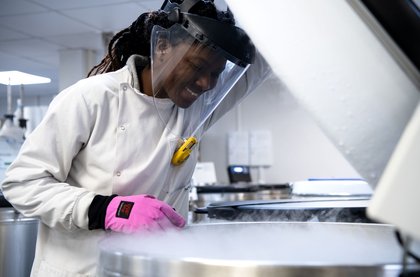Cambridge Cellular Therapy Laboratory (CCTL) is part of the Department of Clinical Haematology at Addenbrookes Hospital, and serves patients across the East of England in this busy, and progressive, HTA & JACIE accredited laboratory. Our role is to support processing and delivery of cell-based transplantation products, and cell-based medicines such as Chimaeric Antigen Receptor T cell (CAR-T) therapies; all used in the treatment of adult and paediatric haematological malignancies.

What we do at CCTL
Based on the Cambridge Biomedical Campus, the largest biomedical research campus in Europe; home to two NHS flagship trusts, multiple world-class research institutes, the University of Cambridge Medical School and a thriving biopharma ecosystem. The CCTL is the campus’s sole GMP facility and is responsible for supporting the Cambridge haematopoietic stem cell transplant program (including the Ipswich unit) and the Norwich transplant programme.
The heart of the CCTL service is delivering cellular therapies, including providing testing, processing, cryopreservation and storage of cells to treat patients with haematological malignancies. The lab will expand to a new state-of-art, purpose built facility within the Jeffrey Cheah Biomedical Centre, which will provide for 4 Grade B clean rooms each with independent air handling with capability to manage class 1 and class 2 GMOs. The CCTL along with the clinical transplant programs is involved in increasing Immune Effector Cell and ATMP/ATIMP work. Cambridge has been designated by NHS England as a provider for chimeric antigen receptor T cells and is integrally involved in clinical trials in melanoma, lung cancer and haematological malignancies.
We process over 200 apheresis products per year in both autologous and allogeneic settings, including products from donor registries from all over the World. These may be swiftly infused into patients, or cryopreserved to be thawed and infused into oncology patients after conditioning therapy, as a strategy to treat various blood-borne malignancies. Our roles as NHS based scientists make us an integral part of the clinical team and bring us directly into contact with patients as we process and deliver their cells for life-saving interventions.
Current vacancies
We are currently recruiting across various roles as part of a strategic expansion of our service to treat more patients across our region, with an increasing array of cellular therapies. Alongside traditional stem cell transplantation, CAR-T’ cell products now feature strongly in our latest armoury of therapies to combat cancer. These can be as licensed medicines, or as experimental therapies in clinical trials.
We intend to create a centre for translational manufacturing of novel cell and gene therapies at the heart of Cambridge University and Addenbrookes NHS Foundation Trust .
Non-urgent advice: If these opportunities sound attractive to you, then please check out the vacancies now:





